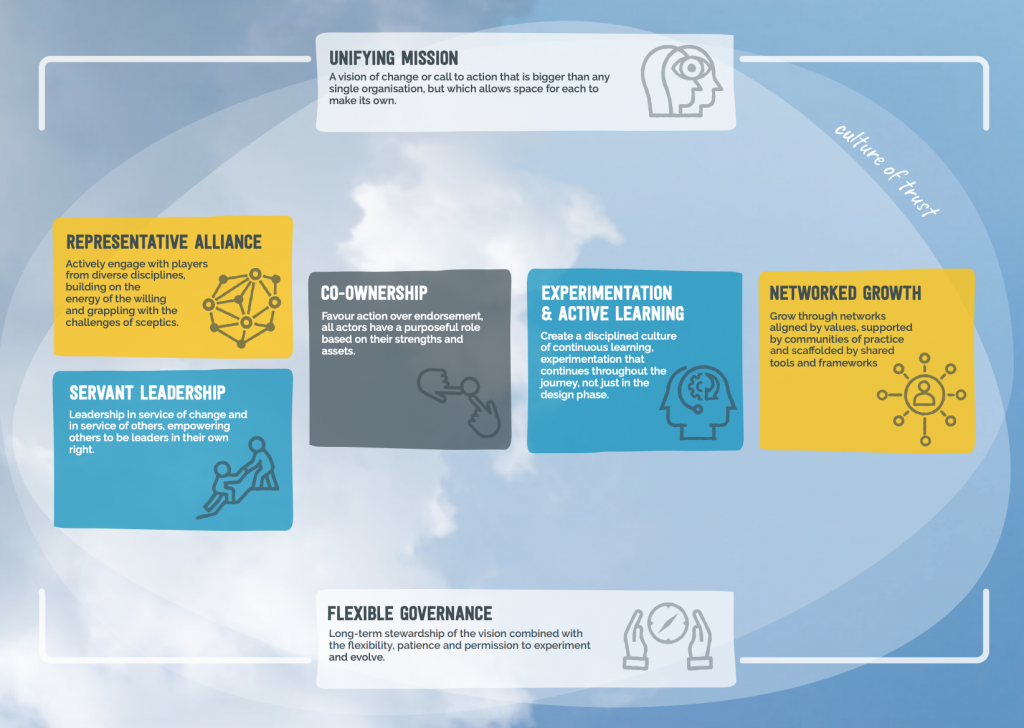Tonight Big Change hosts an event with our long-time supporter and wise friend Simon Sinek. Simon is sharing insights from his new book The Infinite Game. We’re very excited to speak to him about this because the theory touches on so many areas of our thinking.
The book proposes that we treat too many things in life as ‘finite games’ that can be won or lost – with set rules, players, objectives and measures. In fact, things like our education, our career and our health are ‘infinite games’ without set rules or finish lines, they are games where the objective is not to win, but to continue playing and to get better at the game over time.
Sinek has developed a framework of five elements for bringing an Infinite Mindset to business leadership. What interested us so much about these, is how closely they map to the attributes of change leadership we saw in our Reimagining Education Together pioneers.
Sinek’s Infinite Game framework:
- A just cause – the purpose and mission that drives and powers you to outlast your competitors. It propels you forward in the face of adversity and empowers you to persevere when you feel like giving up.
- Courage to lead – The courage to stand up for your just cause even when there are other pressures.
- Trusting teams – creating a culture where people feel safe to be themselves and to raise their hand and admit to mistakes, with confidence that they will be supported.
- Worthy rivals – adversaries are acknowledged and treated with respect, but our success or failure isn’t measured against them. Ultimately we are competing against ourselves, to improve, and our success or failure should be measured against our just cause.
- Open Playbook – Too many organizations pursue a variable cause with a fixed strategy, Sinek theorizes, rather than pursuing a fixed cause with a variable strategy.
Compare this to the Reimagining Education Together framework for change:

Just cause and Unifying mission share a lot in common – what is the core idea, that is inspiring enough to keep players in the game even when the odds are stacked against you.
A culture of trust is an underlying principle of the Reimagining Education Together framework. Sinek’s description of Trusting Teams that are able to express vulnerability, make mistakes and be supported has a lot in common with what we saw when looking at Servant leadership and Co-ownership of projects.
The importance of Worthy rivals is perhaps not so explicitly stated in the Reimagining Education Together framework, but part of the findings when looking at building a Representative alliance was the need to engage with people and organisations that did not agree with your central proposal and to understand their objections, to make your project better.
Existential flexibility was really key to the long-term success of the pioneering projects in Reimagining Education Together. Experimentation, Active learning and Flexible governance both speak to the need for education projects to able to try things out, make mistakes, change tack and keep going in service of the wider mission.
The courage required to lead change is something that we didn’t call out in our reporting. Maybe we should have. To move away from the status quo of education is no small endeavour. The pioneers we spoke to frequently faced challenge from policy makers, parents, fellow teachers and established schools – all of whom had good intentions. Often the real social impact of their work wouldn’t be felt for decades, so they had to trust in the integrity of their mission and be prepared to change their approach as their information or context changes. This all requires bravery.
Perhaps our biggest take away from The Infinite Game (so far – the book isn’t out yet) is that if you move from a finite view of success in any field, then your behaviour has to change.
The pioneers we spoke to all pushed against the finite parameters of what we think of as the education system. They questioned the objectives of the game, the players, the rules and the measures.
